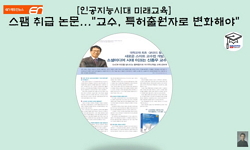이 글의 목적은 전자우편광고가 가지는 헌법적 및 사회적 순기능을 전제로 하면서 그 해악을 방지하기 위한 스팸규제입법에 대해 평가하고 그 정책방향을 짚어보는 데에 있다. 이를 위해 아...
http://chineseinput.net/에서 pinyin(병음)방식으로 중국어를 변환할 수 있습니다.
변환된 중국어를 복사하여 사용하시면 됩니다.
- 中文 을 입력하시려면 zhongwen을 입력하시고 space를누르시면됩니다.
- 北京 을 입력하시려면 beijing을 입력하시고 space를 누르시면 됩니다.

스팸(SPAM) 규제입법에 대한 평가와 정책방향 = The Evaluation and Policy Orientation for the Regulatory Laws on SPAM
한글로보기https://www.riss.kr/link?id=A102913435
- 저자
- 발행기관
- 학술지명
- 권호사항
-
발행연도
2004
-
작성언어
-
- 주제어
-
KDC
366
-
등재정보
KCI등재
-
자료형태
학술저널
- 발행기관 URL
-
수록면
1-35(35쪽)
- 제공처
-
0
상세조회 -
0
다운로드
부가정보
국문 초록 (Abstract)
이 글의 목적은 전자우편광고가 가지는 헌법적 및 사회적 순기능을 전제로 하면서 그 해악을 방지하기 위한 스팸규제입법에 대해 평가하고 그 정책방향을 짚어보는 데에 있다. 이를 위해 아래에서는 우선 스팸 증가의 사회경제적 및 기술적 요인을 간략히 검토하고(II), 다음으로 스팸에 대한 법적 규제를 광고표현의 자유의 관점에서 접근하여 규제의 필요성을 인정하되 그 규제의 한계와 정책방향을 제시한다(III). 이어 비교적 관점을 획득하기 위하여 유럽연합과 미국에서의 스팸에 대한 대응입법의 현황과 그 내용을 간략히 소개한다(IV). 그리고 마지막으로 현행 정보통신망이용촉진 및 정보보호 등에 관한 법률을 중심으로 해서 현행의 규제내용에 관한 몇 가지 문제점을 분석한다(V).
이 글에서 필자가 주장하고자 하는 요지는 다음과 같다. 스팸(spam), 즉 요청하지 않은 전자우편광고(Unsolicited Commercial E-Mail)도 헌법 제21조의 언론출판의 자유(광고표현의 자유)에 의한 보장을 받는다. 물론 허위ㆍ과장ㆍ기만적인 전자우편광고는 보호범위에서 제외된다. 그렇지만 스팸 중에도 헌법이 보호하고자 하는 기능(소비자에 대한 정보전달과 설득기능)을 수행하는 정상적인 스팸은 헌법의 보호를 받고, 따라서 모든 스팸을 불법화해서는 안 된다. 즉 합법적인 스팸과 불법적인 스팸을 구별해야 한다. 또한 누구나 수신자의 전자우편주소를 알고 있다면 “구조적으로” 전자우편함에의 투입이 허용되어 있는 환경에서, 수신자가 요청하지 않은 전자우편광고를 발송하는 것이 그 수신자의 사생활을 곧 바로 침해한다고 할 수 없다. 따라서 정부가 전자우편광고에 대해 opt-in 방식을 채택하여 수신자의 사전 동의 없는 전자우편광고의 발송 자체를 불법화하는 것은 정상적인 스팸발송자의 광고표현의 행사에 지나친 부담을 지우는 것일 뿐만 아니라 전자우편의 구조적 메커니즘에 비추어도 타당하지 않다. 이런 점에서 opt-out 방식을 채택하고 있는 현행법(정통망법; 정보통신망이용촉진및정보보호등에관한법률)의 태도는 적절하다.
다만, 현행법은 (i) 규율범위가 지나치게 포괄적이고, (ii) 정작에 규율대상이 되는 “영리목적의 광고성 정보”에 대한 개념정의가 존재하지 않으며, (iii) opt-out 방식의 규제내용이 조밀하지 못하고, (iv) 악성 스팸행위에 대한 규제가 없다. 그리고 (v) 보다 효과적인 법집행수단을 다양한 차원에서 마련할 필요가 있다. 아울러 (vi) 정부는 네트워크서비스제공자에 의한 자율규제와 기술적 해결방안을 제도적ㆍ정책적으로 뒷받침해주는 데 총력을 기울일 필요가 있다.
다국어 초록 (Multilingual Abstract)
The present paper purports to evaluate the current regulatory laws on SPAM or UCEM(Unsolicited Commercial Electronic Mail) and present their policy-orientations for the future, on the assumption that the commercial e-mails have some positive functions...
The present paper purports to evaluate the current regulatory laws on SPAM or UCEM(Unsolicited Commercial Electronic Mail) and present their policy-orientations for the future, on the assumption that the commercial e-mails have some positive functions in the dimension of the socio-economic and constitutional values.
The paper covers the following issues: examining the socio-economic and technical factors of the alarming increase in SPAM (II); setting the limits on the SPAM regulations and presenting the policy orientation in the perspective of the freedom of commercial expression while admitting the necessity of regulation (III); introducing and analyzing the regulatory laws on SPAM in the United States of America and European Union (IV); finally, analyzing the current regulatory laws on SPAM in Korea and presenting some feasible improvement alternatives (V).
The author sets forth the following essential points. Firstly, a spam as a commercial expression is also under the protection of the freedom of speech clause. It goes without saying that the false or deceptive e-mail messages are put out of the constitutional protection. The constitution, however, guarantees the regular and lawful commercial e-mail messages which have communicative and persuasive functions for consumers. Therefore, it is not appropriate to make every unsolicited commercial e-mail messages illegal.
Secondly, under the circumstances of online system in which anyone who get the e-mail address of a recipient is structurally able to send unsolicited e-mail message to the recipient s inbox, it cannot be said that sending unsolicited commercial e-mail to an recipient s inbox violates straight his privacy.
Thirdly, the opt-in approach in regulating the spam is not proper and reasonable policy option. The current opt-out approach is appropriate in terms of the online circumstances and the consitutional values of commercial e-mail.
Fourthly, the current Act, however, has problems as follows: (i) the Act is too comprehensive in the regulatory scope; (ii) the Act has no definition about the profit-oriented commercial information ; (iii) the regulatory contents of the opt-out approach are lacking in elaboration; (iv) the Act does not contain any regulations on the malignant spam; and (v) the more efficient and effective measures for execution are necessary.
목차 (Table of Contents)
- 요약
- Ⅰ. 머리말
- Ⅱ. 스팸 증가의 사회·경제적 및 기술적 요인에 대한 이해
- Ⅲ. 스팸규제에 대한 헌법적 관점
- Ⅳ. 스팸에 대한 외국의 입법적 대응
- 요약
- Ⅰ. 머리말
- Ⅱ. 스팸 증가의 사회·경제적 및 기술적 요인에 대한 이해
- Ⅲ. 스팸규제에 대한 헌법적 관점
- Ⅳ. 스팸에 대한 외국의 입법적 대응
- Ⅴ. 우리나라의 입법적 대응에 대한 평가
- 참고문헌
- Abstract
동일학술지(권/호) 다른 논문
-
- 한국정보법학회
- 최경수(Choe Kyong soo)
- 2004
- KCI등재
-
- 한국정보법학회
- 이해완(Hae Wan Lee)
- 2004
- KCI등재
-
- 한국정보법학회
- 김상택(Kim Sang Taek)
- 2004
- KCI등재
-
- 한국정보법학회
- 황근(Kuhn Hwang)
- 2004
- KCI등재




 스콜라
스콜라


